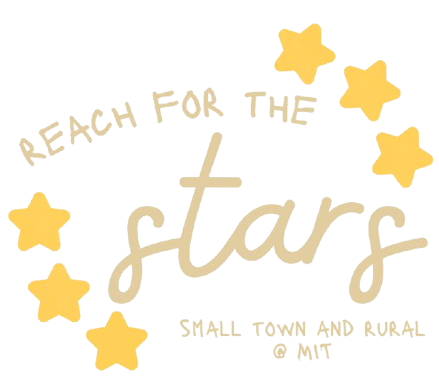Small-Town & Rural Students @ MIT

Opportunities for Exploration
💫 STARS College Network is a national initiative designed to increase access and support for high-achieving students from small-town and rural backgrounds. We host STARS-specific webinars, visit rural schools across the country, and offer an on-campus fly-in program for high school juniors called STARS@MIT, as well as a fly-in for high school counselors called the STARS Counselor Conference – Northeast Tour. Through community-building, mentorship, and advising, we aim to demystify the admissions process and help students imagine themselves here.
🌎 Each fall, MIT hosts a fly-in program for high school juniors at the time of the program, from rural and small-town backgrounds. Students visit campus, meet current students, attend workshops, and get a glimpse of life at MIT. It’s an opportunity to build community and start seeing yourself in a place like this. Applications open in June every year.
🫶 Whether your hometown has a single stoplight or a few thousand people, MIT values your story. The STARS community at MIT is here to remind you: You are not alone, you are not behind, and yes—you can thrive here. Meet our Ambassadors and email them student specific questions at [email protected]
Interested? Check-out some resources below.
Community + support
MIT STARS Ambassadors
Sometimes, the best way to understand a place is through the people who live it. Connect with our Ambassadors to learn about their experiences!
FLI@MIT
The MIT First Generation/Low Income Program provides undergraduates with community, resources, and support as they navigate MIT. Engaging students before they step on campus to accepting their diploma, FLI supports students every step of the way through holistic advising and programming grounded in four pillars of student success:
Intercultural Engagement
As community builders, Intercultural Engagement provides support, advocacy and education to MIT’s diverse student populations. They offer educational and social opportunities for students and 70+ cultural/identity based student organizations.
Undergraduate Advising Center (UAC)
The UAC is MIT’s academic advising hub for undergraduate students and advisors. Through collaboration with Office of the First Year (OFY) and their Student Success Toolkit is the UAC support students in making the most of their time at MIT, ensuring academic, extra-curricular, career, and personal wellbeing success.
Easing the academic transition
Learning Communities
Experimental Study Group (ESG)
Coming from a small high school, I was used to interacting with my teachers every day and appreciated how I could always ask questions, connect with them easily, and just stop by to chat. Going into MIT, the idea of sitting in a huge lecture hall, just one face in a crowd of hundreds, made me nervous about falling behind. That’s why I chose to join ESG, where the focus on small, interactive classes felt much more familiar and supportive. I loved being able to comfortably ask questions live during lectures and have conversations with my professors and peers. The weekly Friday lunches were also a highlight since I could talk with faculty and fellow ESG-ers not just about class, but about life at MIT and how our freshman year was going. I’ve met some of my closest friends through ESG, and the community made it so much easier to adjust to the academic pace here without feeling overwhelmed or lost.
Lanie Dela Pena, Class of ‘27
Terrascope
I joined Terrascope because I was looking for an engaging and hands-on design class during my freshman year as I was considering majoring in mechanical engineering (Course 2). Terrascope offers project-based classes focused on sustainability and Earth systems, one of which is 2.00C: Design for Complex Environmental Issues, which I took during my freshman spring.
Through the class, I immediately fell in love with both the community and the major. We worked in teams to solve real-world problems for a client, not just through mechanical solutions, but also by establishing team norms and workflows, which helped me strengthen my skills in communication and teamwork. The instructors took a hands-off but supportive approach, encouraging us to take ownership of how we wanted to run the class. I became really close with my team and discovered how much I enjoy working in an innovative, problem-solving environment. Terrascope played a big role in my decision to pursue mechanical engineering.
Lanie Dela Pena, Class of ‘27
Mainstream classes that tend to be smaller
8.01L
Coming from a high school in a small town, calculus based physics was not a class that I had access to. Honestly, the bulk of my physics knowledge came from a ninth grade ‘physical science’ course. The thought of doing 8.01 (Physics I: Classical Mechanics) in the traditional TEAL format with 70 other students trying to solve a problem at the same time as me gave me immense anxiety. Luckily, my math placement test presented me with the option of taking 8.01L, and I jumped at the opportunity. Due to the small scale of the class, we had immediate access to the professor or TAs when we got stuck on a practice problem. Moreover, the small nature of the class allowed for the staff to pay closer attention to the students and occasionally reach out first when they noticed that we were struggling. This is a big help in the first semester of college where reaching out for help can feel like a monumental task. While other students tried to convince me to stick it out in mainstream 8.01 so I did not have to stay at MIT over IAP, 8.01L had an immense impact on my experience and sense of belonging in my freshman year at MIT. More than anything else, 8.01L gave me a community of students who didn’t come from ‘cracked’ STEM high schools and made me feel like there was a place for people with my academic background at MIT.
Kelsey Woods, Class of ‘27
6.100L
As someone who had never written a line of code before coming to MIT, I was initially intimidated by the idea of learning how to program. I had heard that the standard introductory course, 6.100A, moved very quickly since it is condensed into just half a semester, so instead I chose to take 6.100L, a version of the course that covers the same material but over a full semester. It turned out to be exactly what I needed since it gave me the time and space to really understand the concepts, practice the skills, and build confidence. Taking the time to build this foundation made a big difference when I later took other programming classes required for my major.
Lanie Dela Pena, Class of ‘27





